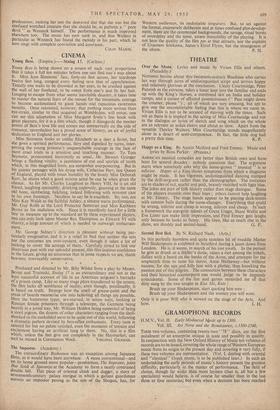CINEMA
• Young Bess. (Empire.)—Stalag 17. (Carlton.)
Young Bess is being shown on a screen of such vast proportions that it takes a full ten minutes before one can find one's way about it. Miss Jean Simmons' face, forty-six feet across, her teardrops twelve feet long, congeal every feeling save that of apprehension. Timidly one waits to be drowned in her eyes, to be crushed against the wall of her forehead, to be swept from one's seat by her hair. Longing to escape from what seems inevitable disaster, it takes time to master the natural fears of the mouse for the mountain, courage to become acclimatised to giant hands and rapacious cavernous mouths. Once reassured, however, that nothing more serious than eye-strain, similar to that acquired at Wimbledon, will ensue, one can see this adaptation of Miss Margaret Irwin's fine book with great pleasure, for it is a film which, though it disregards the mooter Points of Bess's love life and comes out unreservedly on the side of romance, nevertheless has a proud sense of history, an air of joyful dedication to England and her glories.
Miss Simmons looks as unlike Elizabeth as a deer a ferret, but She gives a spirited performance, fiery and dignified by turns, inter- preting the young princess's unquenchable courage in the face of most cruel trials in a sensitive and touching manner. To Tom Seymour, pronounced incorrectly as usual, Mr. Stewart Granger brings a flashing vitality, a jauntiness of eye and sparkle of tooth Which, in this magnified form, are somewhat overpowering. But in his quieter passages with his dying wife, Catherine Parr, late Queen of England, played with sweet humility by the lovely Miss Deborah Kerr, he shows what a good serious actor he can be when given the chance. As for Mr. Charles Laughton as Henry VIII, he is an old friend, laughing uncouthly, drinking copiously, gnawing at the same old bone, slobbering, belching, indeed following with reverent care in his own footsteps. Needless to say he is excellent. So, too, are Miss Kay Walsh as the faithful Ashley, a sincere warm performance, Mr. Guy Rolfe as the Lord Protector Somerset and Miss Kathleen Byron as his malicious wife. Since it is manifestly hard for a little boy to measure up to the standard set by these experienced players, one can only look upon Master Rex Thompson as Edward VI with charity, a large amount of which is needed to outweigh embarrass- ment.
Mr. George Sidney's direction is pleasant without being par- ticularly imaginative, and it is a relief to find that neither the sets nor the costumes are over-opulent, even though it takes a lot of looking to cover the acreage of them. Carefully timed to link our illustrious past with our splendid present, this film inspires \confidence in the future, giving an assurance that in some respects we are, thank heavens, irrevocably conservative.
Produced and directed by Mr. Billy Wilder from a play by Messrs. Bevan and Trzcinski, Stalag 17 is an extraordinary and not in the least successful account of life in an American sergeant's barracks of a prison camp. Like so many stage plays transferred to tile screen, the film lacks all semblance of reality, even though, presumably, it is based on truth. Strange how the smell of grease-paint and the creak of boards mesmerise one into believing all things are possible. Here the humorous types, sex-starved, in union suits, looking at Russian female prisoners through a telescope, the Germans being beastly in a jovial way, Mr. William Holden being suspected of being a stool pigeon, the dozens of other characters ranging from the shell- shocked to the cuckolded seem to be quite out of this world, following a dramatic pattern devised by box-office enthusiasts, Every taste is catered for but no palate satisfied, even the moments of tension and excitement having an artificial tang to them. No, this is a film Which, unless the feet give out completely in the Haymarket, can
well be missed in Coronation Week. VIRGINIA GRAHAM,


































 Previous page
Previous page